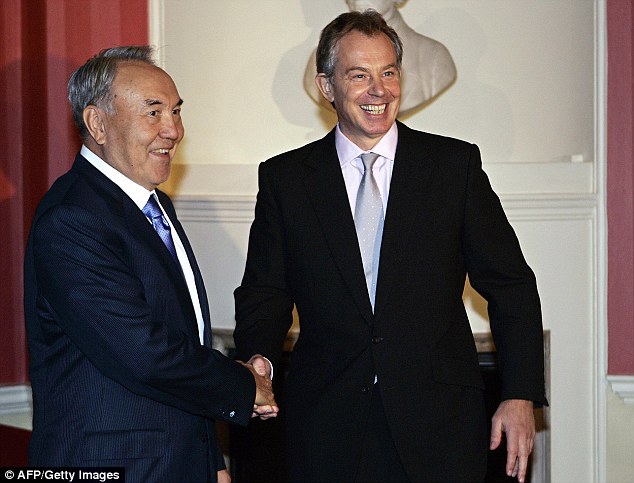 As Blair's liar-in-chief Alastair Campbell claims the moral high ground after Chilcot, the chilling memos that reveal how he touted for work to 'rebrand' one of the world's most repressive tyrannies
As Blair's liar-in-chief Alastair Campbell claims the moral high ground after Chilcot, the chilling memos that reveal how he touted for work to 'rebrand' one of the world's most repressive tyrannies
- Alastair Campbell was Tony Blair's spin doctor during his tenure as PM
- Name mentioned hundreds of times in Iraq War report but not blamed
- Leaked documents show he and Blair hired their PR services to a despot
- Letters show they worked with Kazakhstan dictator Nursultan Nazarbayev
Just 52 minutes after Sir John Chilcot had published his 12-volume, 2.6 million word inquiry into the Iraq War, one of the most notorious among its cast of characters had already staked out his position on the moral high ground.
In a blog post larded with self-righteousness, Tony Blair’s former propagandist Alastair Campbell publicly declared himself innocent of all wrongdoing, boasting that he’d been cleared of ‘sexing up’ any of the notorious ‘dodgy dossiers’ that made the case for the 2003 invasion.
Though mentioned hundreds of times in the report, and criticised by several key witnesses, including an intelligence officer who called him ‘something of an unguided missile’ Campbell was neither censured nor singled out for blame.
Instead, Chilcot largely blamed flawed intelligence for the dodgy ‘dossiers’ that Campbell’s Downing Street spin machine churned out during the rush to war, one of which famously contained passages lifted from an old article by a PhD student.
‘That is four inquiries now which have cleared me of wrongdoing with regard to the WMD dossier presented to Parliament in 2002,’ wrote Campbell.
‘And I hope that the allegations we have faced for years — of lying and deceit to persuade a reluctant Parliament and country to go to war or of having an underhand strategy regarding the respected weapons expert Dr David Kelly — are laid to rest.
‘The truth was — and remains confirmed today — that the so-called sexing up of intelligence never happened.’
Dr Kelly was, of course, a Ministry of Defence whistle-blower who in 2003 secretly told the BBC he believed Downing Street was exaggerating the threat of Saddam Hussein.
In the ensuing row between Downing Street and the state broadcaster, Campbell fought to bring Dr Kelly’s name into the open (a development that eventually occurred courtesy of the MoD’s press office).
Dr Kelly was then subjected to intense pressure from the media and politicians — and a few days later, killed himself.
Fast forward 13 years, and Campbell claimed this week that it was the BBC — rather than either him or Tony Blair — which had blood on its hands. He said that if the broadcaster had responded properly to Downing Street’s complaints over its reporting about one of the ‘sexed-up’ dossiers, then Dr Kelly ‘would almost certainly be alive today’.
It was a classic piece of news management from a PR man who, throughout his career, has tended to regard attack as the best form of defence.
Sir John Chilcot (left) largely blamed flawed intelligence for the dodgy ‘dossiers’ that Campbell’s Downing Street spin machine churned out during Britain's rush to war, led by former Prime Minister Tony Blair (right)
Whatever one’s view of Campbell, or of the conclusions of the Chilcot report, it is hard not to be struck by the touching sense of loyalty he still displays for Tony Blair — a man he appears to hold in near saintly regard and who he’s continued to defend vigorously long after other former acolytes have abandoned their faith.
Yet loyalty, of course, is not always a one-way street.
For while Blair doubtless cherishes the continued public support of his former spin doctor — who left Downing Street a dozen years ago — their relationship continues to prove, behind the scenes, to be very lucrative indeed for Campbell.
These days, Campbell (who was the inspiration for Malcolm Tucker, the foul-mouthed spin doctor in TV’s The Thick Of It) makes some of his living from his celebrity status, describing himself as an ‘author, broadcaster and public speaker’, who earns a shilling from media appearances and speeches, and has published among other things a best-selling edition of his diaries.
The rest of his income, however, still comes from the unsavoury (and much less public) business of lobbying and media management.
Campbell is a senior figure at Portland Communications, a New Labour PR and strategy firm started by former Downing Street spin colleague Tim Allan, which lists him on its website as ‘one of the country’s foremost experts on communications, leadership and strategy’.
Intriguingly, one of the firm’s very lucrative clients, with whom Campbell has worked closely in recent years, is the government of Kazakhstan, the resource-rich central Asian dictatorship.
The country has been ruled with an iron fist since 1991 by Nursultan Nazarbayev, a notorious despot accused of rigging elections, murdering political opponents, shutting down opposition newspapers, torturing dissidents and funnelling vast amounts of money to a shady network of cronies and family members.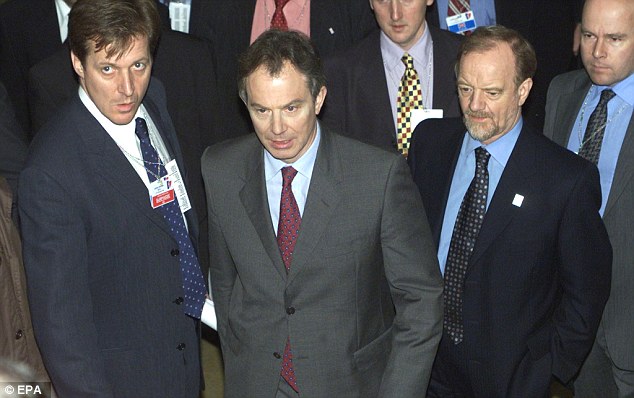
Former spin doctor Alastair Campbell still displays a strong sense of loyalty for ex Prime Minister Tony Blair. Pictured, the pair with ex-foreign minister Robin Cook
It’s not surprising, therefore, that this vile regime is a bete noire of the world’s top human rights groups, not to mention many within Campbell’s beloved Labour Party.
For this reason, there was controversy in 2011 when it emerged that Tony Blair had signed a multi-million-pound contract to advise and lobby for Nazarbayev.
There was still more controversy when it subsequently emerged that Campbell — along with a selection of colleagues from Portland — had been brought in, at the prompting of his former boss, to help the dictatorship handle his PR.
However, the full extent of the work Campbell carried out there, and its links to Tony Blair’s commercial machine, has never been fully exposed. Perhaps understandably, both have sought to play it down.
That makes it intriguing to be handed a selection of leaked documents shedding light on not just the nuts and bolts of Campbell and Portland’s lucrative commercial relationship with the Kazakhs, but also the way in which Blair has helped them pursue it.
At the centre of these leaks is a four-page document that Campbell wrote to the Nazarbayev government in June 2013.
Slick and professional, it reveals that this man of loudly proclaimed Left-wing principles was at the time attempting to negotiate a lucrative contract for Portland to continue to burnish the global reputation of this highly repressive autocracy.
The memo states that Campbell had recently organised a sales ‘presentation’ at which he and several colleagues from the PR firm had attempted to woo senior figures in its murky and kleptocratic government.
There was controversy in 2011 when it emerged that Tony Blair had signed a multi-million-pound contract to advise and lobby for Kazakhstani despot Nursultan Nazarbayev (pictured, the pair together)
At the meeting, Blair’s former propagandist waxed lyrical about how he intended to create a ‘new national brand’ for Kazakhstan that would, he promised, ‘help make a big difference’ to the dictatorship’s reputation on the world stage.
‘We were very pleased to hear that you felt it was a highly professional presentation and that the visualisation of our proposal for a new national brand for Kazakhstan was very strong,’ Campbell wrote to his wealthy would-be client.
‘I certainly believe it laid strong foundations for the campaign ahead. Taken in conjunction with the research we presented, and your own assessment of the situation, it can be the basis of a strong branding proposal which alongside continuing economic, social and diplomatic change can help make a big difference to the way Kazakhstan is seen.’
That, of course, was a big ask. Despite Tony Blair’s earnest efforts, his would-be client continued to have an appalling reputation on the world stage. The U.S. state department accuses Nazarbayev of ‘pervasive corruption’ along with ‘torture’, ‘restrictions on freedom of speech’, ‘arbitrary arrest’ and ‘discrimination and violence against women’.
Against this backdrop Campbell claimed that — for a price — he could improve the country’s tarnished image. Best of all, there was no mention of the dictatorship having to do anything so painful as staging proper elections or releasing political prisoners.
The note, which was addressed to Nazarbayev loyalist Marat Tazhin, the Kazakh state secretary, did not contain a single mention of the words ‘human rights’ or ‘democracy’. Instead, Campbell reckoned he’d be able to work wonders for the country’s squalid reputation by doing what he does best: spin.
Describing the ‘brand strategy’ he would provide to the dictatorship, he talks of creating ‘a universal, but adaptable brand’ for the country ‘that can be deployed across a wide range of communications products and campaigns’.
‘We believe this approach can be used to bring together and maximise the efficiency and effectiveness of your existing branding efforts, which I think we agree have been costly but unco-ordinated, and less productive than they should have been.’
At the time the document was written, Campbell’s lucrative work for Kazakhstan already stretched back a year.
He was hired by Portland in May 2012. And within two months, the firm had already secured work helping to set up a new ‘Government Communication Office’ [GCO] in Kazakhstan.
Its role was to spin for the controversial despot and provide ‘rebuttal’ of media stories that might undermine his dictatorship.
This fact is revealed in a second leaked document that has fallen into my hands: a personal letter that Tony Blair sent to Yerzhan Kazykhanov, the Kazakh foreign minister, in July 2012, discussing his ongoing work for the regime.
The former prime minister wrote: ‘Together with Portland, we have been tasked with ensuring the new GCO fulfils its purpose of providing fast and effective communication — both proactive and rebuttal,’ it read.
‘Also it is anticipated Portland will continue to provide support for the Foreign Ministry. The profile of Kazakhstan is only going to increase and so this remains essential.’ All of which suggests that, for at least some of this time, Campbell was doing the same kind of spinning job as he did for years under Blair in Downing Street.
Even before joining Portland, Campbell was on manoeuvres in the central Asian dictatorship.
In October 2011, for example, a reporter from the Financial Times spotted him on a flight from its capital, Astana. Asked what he was doing there, Campbell replied: ‘Partly, I do some work for some energy companies.’
By the summer of 2012, after he’d joined Portland’s payroll, Campbell was even being name-checked in correspondence between Tony Blair and Nazarbayev, discussing how to ‘spin’ a notorious incident in which his government’s police had shot dead 15 striking oil workers in the industrial city of Zhanaozen.
A third leaked document contains a letter of advice from Blair to the despot on what became known as the Zhanaozen massacre.
It is dated July 19, 2012, and states that it was sent in response to a request or ‘invitation’ for advice from the Kazakh government that had been ‘given to Alastair Campbell earlier this week’.
It certainly sounds like a very comprehensive service. And at a later point in his work for the Kazakhs, Campbell appears to have even suggested producing propaganda videos for the Nazarbayev regime.
To this end, his 2013 sales pitch refers to a somewhat awkward moment at their ‘presentation’ when they angered their potential Kazakh paymasters by refusing to leave behind a copy of one such video.
The film had apparently been screened during the meeting. But, perhaps in order to prevent it leaking (a similar video featuring Tony Blair singing the praises of Kazakhstan was once obtained by Vanity Fair magazine), Campbell and co were reluctant to allow it to be ‘widely disseminated’.
This appears to have deeply upset the Kazakh state secretary, Marat Tazhin, who felt insulted and believed that, since Portland was on the Kazakh payroll, they should hand over the film.
In an effort to put things right with his potential paymasters, Campbell therefore wrote:
‘I hope following my meeting with him on Friday, Mr Kazykhanov has been able fully explain the reason why we were unable to leave behind a copy of the video that we showed as part of our presentation.
‘This was prepared purely for use as part of the presentation, in order to help you visualise the brand and understand its potential.
‘Though we were pleased at the very positive reaction, were we to make such a film as part of an agreed branding plan, we would want to do considerable further work on it.
‘In addition, there are legal and copyright issues around the images and music used in the video that heavily restrict its use and transmission which could have caused unneeded grief for both of us . . . There was no bad faith here.’
Alas, despite this earnest entreaty, the pitch failed. Asked about the memo, and his work in Kazakhstan, Campbell declined to comment, referring me to Portland.
At a later point in his work for the Kazakhs, spin expert Campbell appears to have even suggested producing propaganda videos for the Nazarbayev regime
A spokesman for Portland said: ‘This was a proposal for brand co-ordination work that was not taken forward. Alastair is not involved in advisory work on Kazakhstan for Portland and did not do any work on this project since it was not taken forward.’
The firm did not respond to questions asking why Campbell’s PR pitch failed to mention human rights or democracy.
As to when exactly this man of Left-wing principle actually stopped doing work for the Kazakhs, that appears to be anyone’s guess.
Campbell’s June 2013 memo states that recommendations on ‘rebranding’ the dictatorship ‘are due to be delivered at the end of our current contract’, suggesting that his relationship with the dictatorship was still ongoing.
However, in an interview with the Telegraph published less than two years later, in March 2015, he claimed that his work for the Nazarbayev regime had all been carried out ‘several years ago’.
A strange claim, given what we now know, and given what Campbell wrote in documents leaked to the Daily Mail.
Indeed, a cynic might be tempted to wonder if Campbell, notorious for his mastery of the dark arts of propaganda and character assassination, might have been attempting to ‘sex down’ his links to Kazakhstan in that interview.
But as he has been so keen to tell the world this week, that’s not the kind of thing he goes in for at all.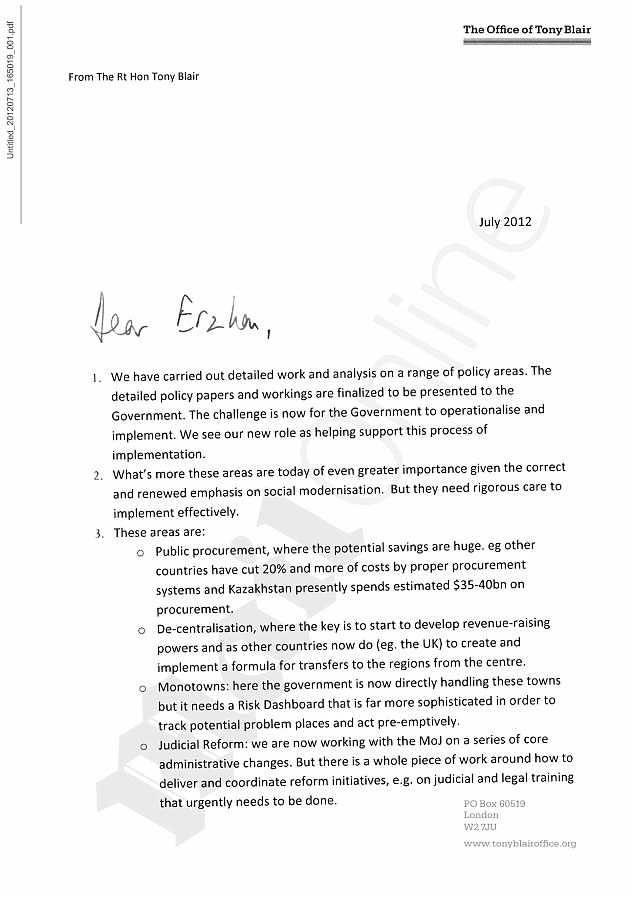
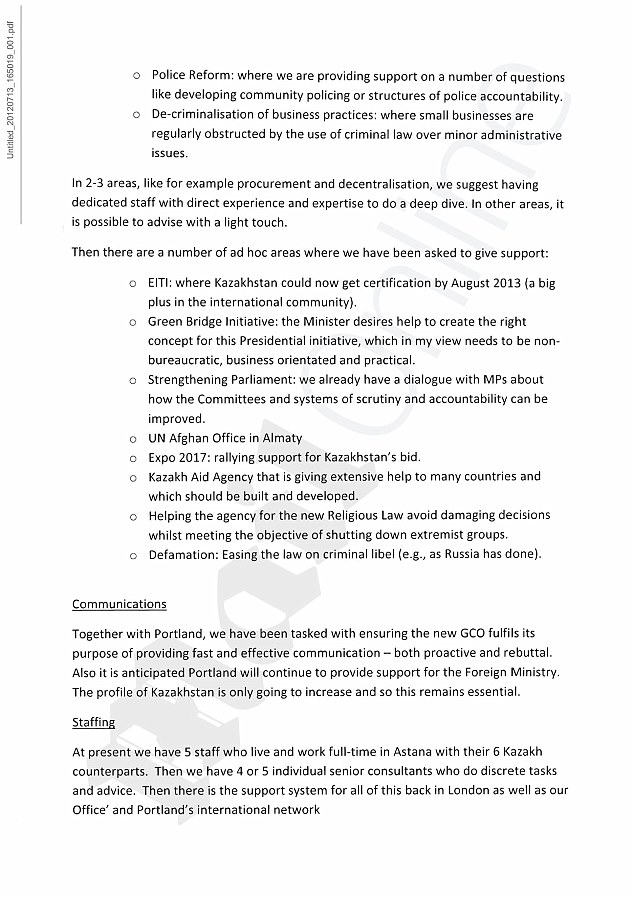
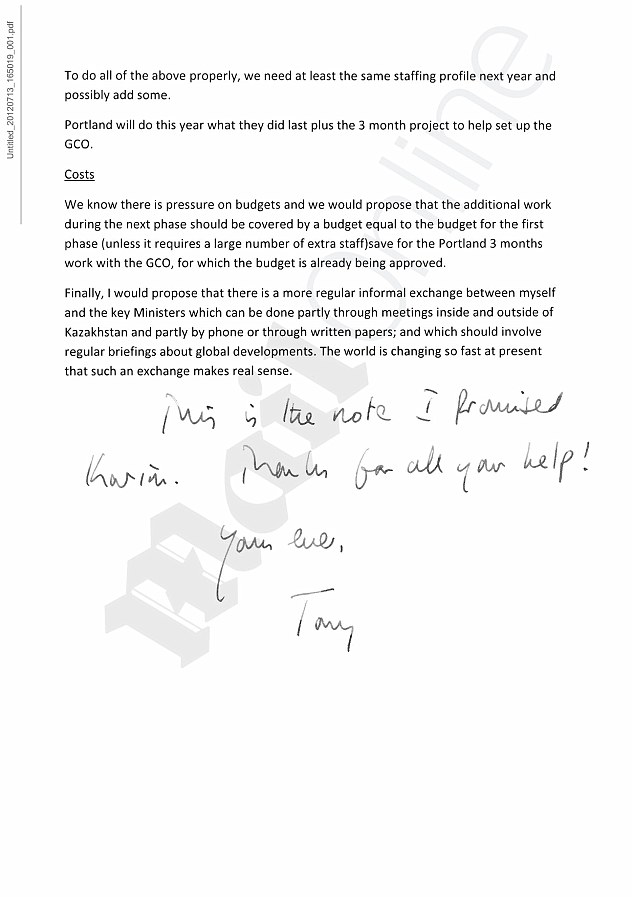
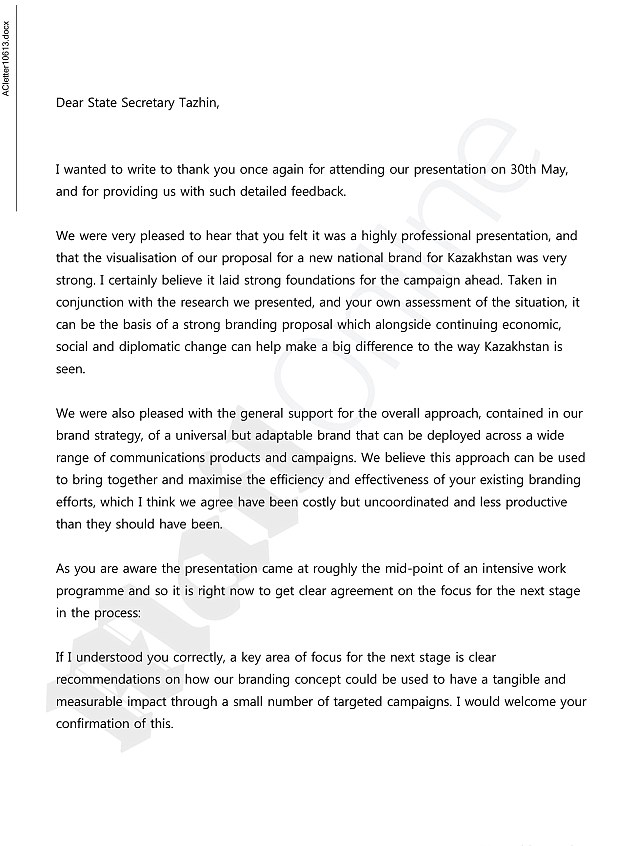
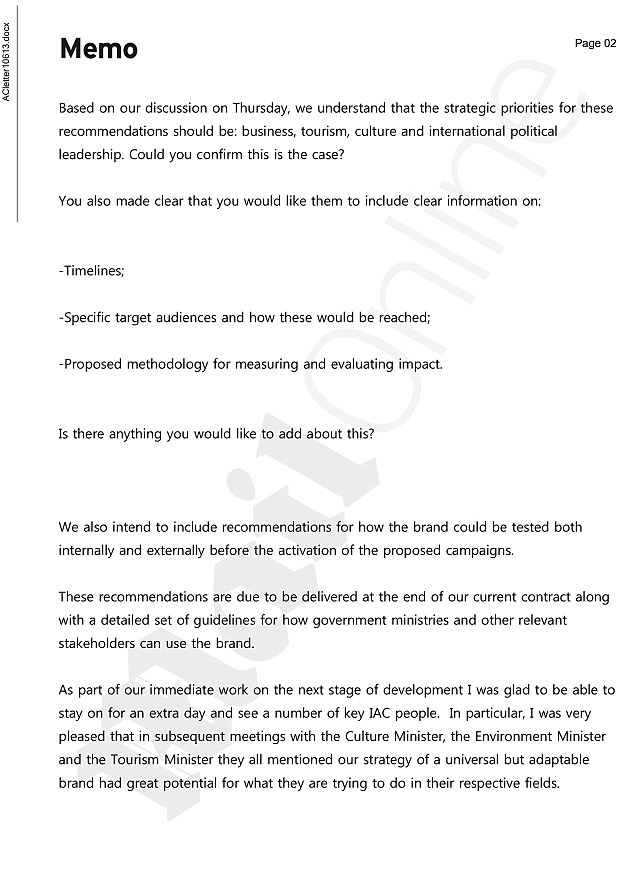
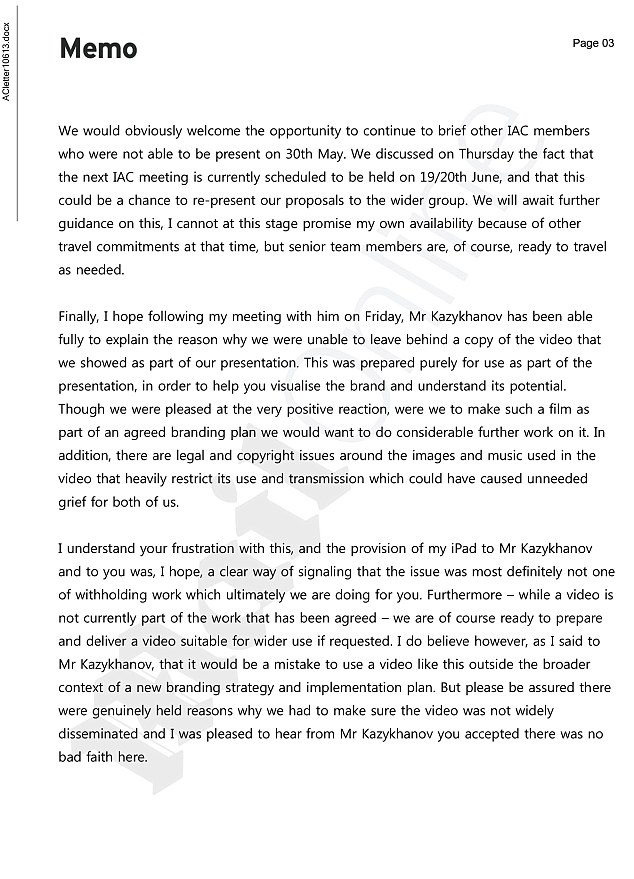
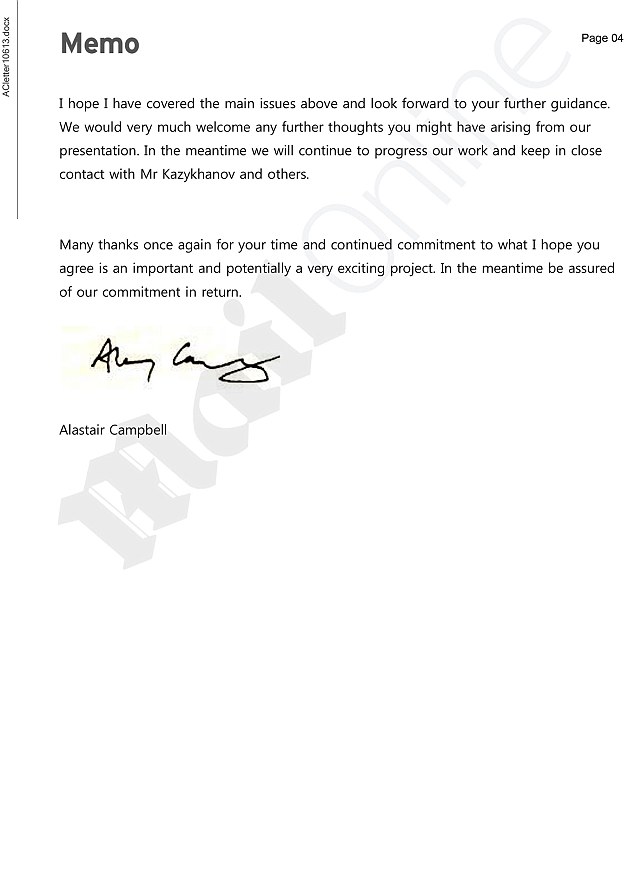
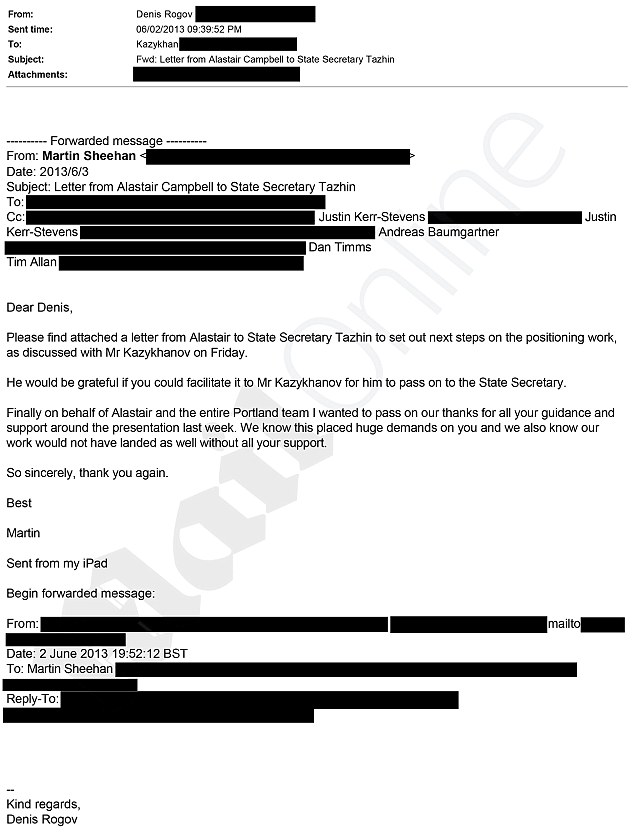
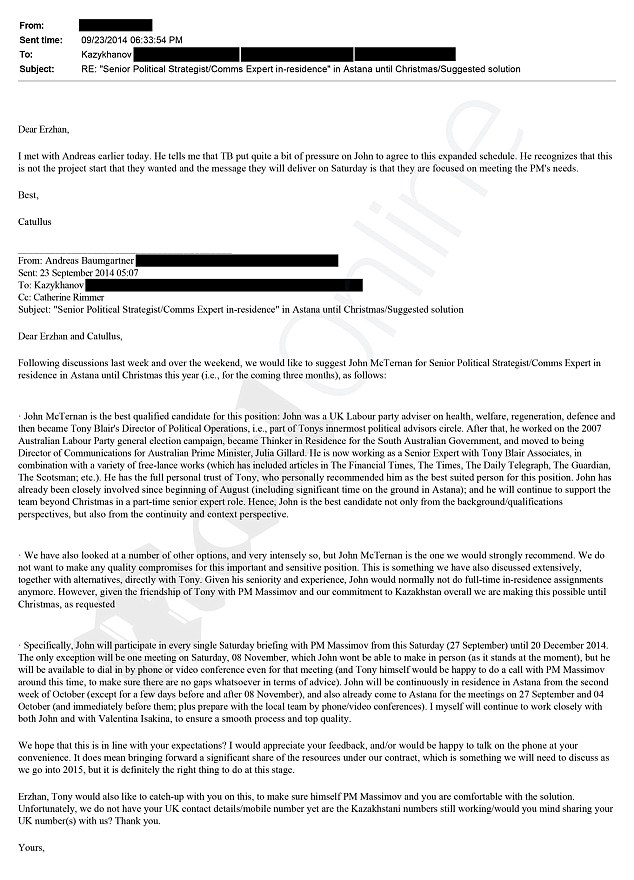
DailyMail, 09.07.2016




